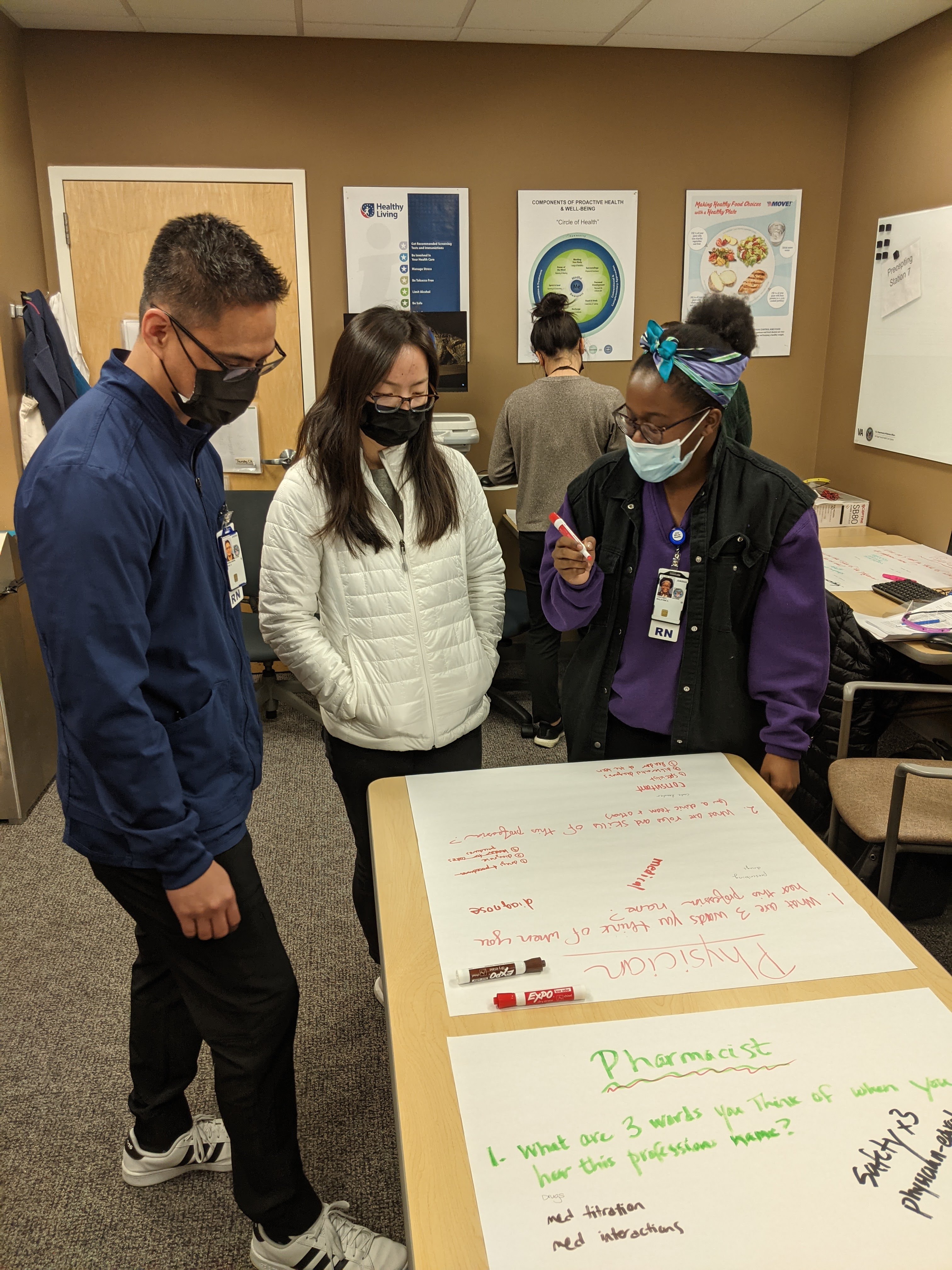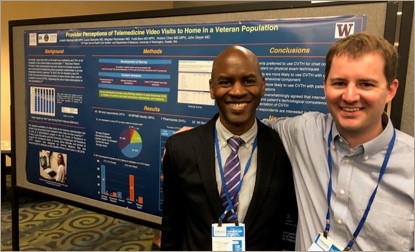Pathway Director
Associate Professor
Division of General Internal Medicine
UW Department of Medicine
"As a resident, some of my favorite things about CoE are the attention given to resident ideas and resident-driven projects to improve not only the CoE, but also to create change at the clinic level. CoE provides the education and mentorship to help residents feel empowered to make a difference in patient care while they are trainees, so they can keep doing great things after residency."
Overview
The Seattle VA CoE is a unique clinic-based pathway within the University of Washington Internal Medicine Residency Program, with a focus on interprofessional education and patient care collaboration.
The CoE was created to transform graduate medical education out of professional silos and to foster collaborative learning and practice. Pathway residents learn and care for patients alongside nurse practitioner students and residents, pharmacy residents, psychology interns and fellows, RN residents, and social work interns.
The CoE experience is comprised of both direct patient care in the Seattle VA Primary Care and Women’s Clinics, as well as protected time for uniquely designed interprofessional didactics. Patients cared for at the Seattle VA often have high medical and psychosocial complexity and greatly benefit from our collaborative, team-based medical home model of care.

GOALS
In the CoE pathway, we strive for:
- Teaching our trainees to work in and lead teams: delivering high quality, patient centered, team-based primary care with a focus on interprofessional collaboration, leadership, and scholarship.
- Moving graduate medical education out of silos by creating interprofessional didactic and direct patient care experiences among internal medicine residents, nurse practitioner residents and students, registered nurse residents, pharmacy residents, psychology fellows, and social work interns.
- Innovative interprofessional curriculum with three longitudinal threads:
- Team-building with Patient Aligned Care Team (PACT) members (primary care-based RN care managers, LPNs, administrative assistants, pharmacists, psychologists and social workers) and "Meet your Colleagues" sessions with other professions/specialists (ie Pharmacy, Physical Therapy, Dentistry)
- Panel Management: Learn population health management skills including accessing clinical data and advancing clinical care for panel patients between provider visits. Themes include Diabetes, HTN, ED utilization, tobacco, alcohol and substance use, and opioid monitoring.
- Interprofessional clinically focused didactic sessions in areas not covered in detail elsewhere in internal medicine residency training (e.g, wound care, women's health, mental health topics and warm handoffs, insomnia, substance use disorder, chronic pain, ophthalmology/ optometry, urology)
- Evaluating our CoE by qualitative and quantitative methods focused on trainee feedback to foster growth and innovation in both the resident and our training programs.
- Developing educational curricula that are sustainable and exportable to our larger residency program and other training programs and institutions nationwide.
COE Residents' video
Here is a 3 minute video created by CoE residents to share their experiences in the pathway:
UNIQUE COE BLOCKS
Novel COE rotations strive to supplement areas not otherwise covered in typical internal medicine residency training.
| R1 | R2 | R3 | ||
|---|---|---|---|---|
| Homeless Healthcare | Leadership/Introduction to Health Administration | Electives designed to meet residents’ education goals, e.g., addiction medicine, gender affirming care, musculoskeletal medicine, etc | ||
Telemedicine and Deployment Health
|
Home-Based Primary Care | Elective designed to meet residents' education goals | ||
| Clinician-Educator Experience | Elective designed to meet residents' education goals |
"I really enjoyed this opportunity to see the decision-making that shapes my educational and working life. I interacted closely with medical leadership, and attended meetings at the clinic-, hospital-, and institution-wide levels. I hope to apply lessons learned here to improving the clinic experience throughout my career." -CoE resident feedback regarding Leadership Elective
- Reference (see attachment): Deeds S, Wipf JE, Corning K, Takahashi T. Expanding Primary Care Experiences with novel rotations for Residents at One University-affiliated Veteran Affairs Center of Excellence in Primary Care Education. J Graduate Medical Education 2019 Dec; 11(6):691-697.
- Reference (see attachment): Deeds S, Wipf JE, Corning K, Takahashi T. Expanding Primary Care Experiences with novel rotations for Residents at One University-affiliated Veteran Affairs Center of Excellence in Primary Care Education. J Graduate Medical Education 2019 Dec; 11(6):691-697.
- Reference (see attachment): Deeds S, Wipf JE, Corning K, Takahashi T. Expanding Primary Care Experiences with novel rotations for Residents at One University-affiliated Veteran Affairs Center of Excellence in Primary Care Education. J Graduate Medical Education 2019 Dec; 11(6):691-697.
QI & Scholarship
All CoE pathway residents participate in interprofessional QI projects and are encouraged to complete scholarly products. The trainee QI projects to date have been very successful, directly benefitting patient care and clinic operations.
To date, there have been more than 120 combined national presentations and workshops, meeting abstracts, and published manuscripts by our CoE trainees.

GRADUATES
Graduates of our CoE (2014-2023) have gone on to diverse and successful professional careers, with 80% choosing to work in the primary care setting. Examples of leadership positions accepted by our graduates include clinic directors, residency program leadership, and director positions in telemedicine, and Patient Safety/QI.



